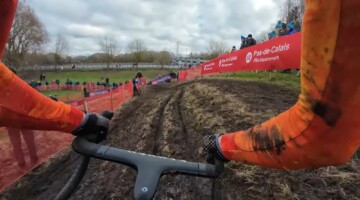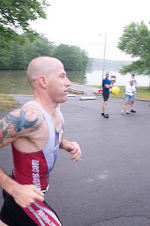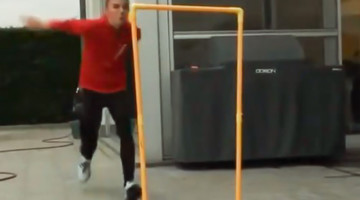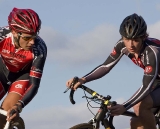by Ken Getchell
If you want to know about the behind-the-scenes work that has made cyclocross one of the fastest-growing sports in America, Mike Hebe should be on your short list of people to interview. Hebe is one of a handful of directors of major cyclocross series in the United States. He has shepherded the influential Champion System MAC Series for the past five seasons and through the greatest growth spurt in the sport’s history. As a series director, Hebe fields thousands of emails over the course of a cyclocross season for no pay and even less public credit. He is also an elite athlete in his own right in cyclocross, road and mountain bike, and does all of this while holding a full-time position as a sales representative that sees him spending considerable time behind the steering wheel of his automobile. In short, he’s representative of all the passionate, driven individuals that have made cyclocross in America what it is today.
So we were more than a little intrigued when we heard that, while still directing the Champion System MAC Series, the 43 year-old Hebe had redirected his own personal athletic goals and, like Lance Armstrong, is challenging the world of Multi-Sport. On November 28th, one week after this weekend’s Champion System MAC season final in Long Island, Hebe will tackle his first Ironman Triathlon in Cozumel, Mexico, with a target time of nine-and-a-half hours. That’s fast. Fast enough, Hebe hopes, to finish top three in his age group against more experienced competitors, and fast enough to have been racing for the overall win at the first five editions of the original Ironman Triathlon in Hawaii. That breaks down to roughly one hour of continuous ocean swimming and almost five hours of a cycling time-trial in a full-aero position before even starting a full 26.2 mile marathon run. To paraphrase comedian Rita Rudner’s famous quip about a friend’s labor prior to childbirth, “My friends scare me … I don’t even like to do things that feel good for that long.”
We spoke to Hebe to find out what drove him to prepare for an Ironman, to strive to not only finish but to podium, and what the cyclocross community could learn from his experience.
Thanks for taking the time, which apparently you don’t have a lot of, to talk to us. I guess my first thought is pretty much the same as everybody else’s, this is insane. What do your friends think?
My friends kind of expect this type of stuff (from me). When I start talking times, though, then they are a bit more taken aback.
So what made you want to tackle an Ironman distance triathlon?
A new challenge more than anything. I have raced on the road. I was doing mountain bike, both endurance and cross country stuff. Of course there was cyclocross, which I have been doing hard for quite some time. Kara (Kara Shiffer, Hebe’s fiancée) is a big influence. Watching her compete, go to 70.3 World’s (i.e.: Half-Ironman) and race to be top American in her age group in 2008 was a huge influence. I also started in cycling in 1987 by racing triathlon. In 1990 I missed qualifying for Kona by one spot at the Texas Hill Country Long Course Nationals. I was in debt and mentally crushed. I ran a trail marathon in Boulder in November 1990 and never ran again until I was at the 70.3 World’s with Kara. I figured if she was racing a half-marathon after a 1.2 mile swim & 56 mile bike, I could at least run for twenty minutes. Wow, that was a rude awakening.
You’re not the first cyclist to tackle Triathlon; three-time Olympian John Howard won the Hawaii Ironman in 1981, and Lance Armstrong has stated that triathlon will be his focus after this year. How did you transition from cycling to multisport?
As I said earlier, I actually started in multisport. When I quit, I vowed never to return unless I felt I was at a level at least as good, if not better. Right now, I think I am MUCH better. The actual transition was with a few local events and XTerra racing (off-road triathlons and duathlons with trail running and mountain bike). My first tri was the Mt. Gretna race. It’s pretty big, locally, with 700ish competitors. I placed fifth that day. The next month I was second at the Pinchot triathlon, and was pretty much hooked right then. It was cool because Kara raced Pinchot and won, and my mom was there to watch the race. She watched me at Pinchot 22 years ago do that same event.
What are your expectations and emotions for the race as you make final preparations?
I have very high expectations. That being said, I also respect the distance immensely. But I do not fear it. I have a great coach, Mike Kuhn of PowerOn coaching, who has given me great training plans. I am very confident in my fitness level. I can not control the weather. I can not control who else shows up at the race. I can control everything that I do. If that happens, my goal is to be on the age group podium, legit podium top three, and I think I can race a 9:30 in good conditions. At the end of September, I raced the Chesapeakeman Ironman Aqua Velo event as a test day. I finished the Ironman distance swim & bike in 6:00 and was second overall. The swim in Cozumel is a full 10+ minutes faster than Chesapeakeman due to currents. That basically leaves me 3:30 to run the marathon, an eight minute/mile pace. That is my goal pace. In training I have been doing 16 mile runs on 6:50 pace.
Tell us about the event itself.
The Ford Ironman Cozumel is in its second year. The swim is right over the Chankanaab dive reef. It’s a National Park and regarded as one of the best dive reefs in the world. The swim is fast, most times are around 10 minutes faster than other Ironman races. The bike course is three loops around the island. If there are strong winds on the eastern side it will be very hard, like Chesapeakeman was. I had 15-20mph swirling winds there. Cozumel would be three, 15-mile sections of a cross-headwind. I rode a 4:53 for the 112-mile bike leg on an ill-fitting new bike at Chesapeakeman. I think I can still go sub 5:00 at Cozumel. The run sounds like a party. It goes through the hotel district and then into a residential district. It’s three 8.8-mile out-and-back sections on the same road. It may sound boring, but there will always be spectators around you cheering; and that will be invaluable for me.
You have been very involved in cyclocross for a very long time. You’ve been an athlete, series director and promoter (Hebe was the featured promoter in Cyclocross Magazine’s “Promote the Promoter” contest in issue 3, page 32). What can cyclocross learn from triathlon, which has become hugely popular in only a few decades?
The biggest thing is PRE-REG ONLY. No day-of registration. ’Cross and triathlon are very similar. The main demographic is the competitor who wants an experience. They are not racing for prizes, and rarely even racing to be in the top ten in their age-group. They are racing to challenge themselves and have fun. Both Tri and CX are very open and welcoming to newcomers. That is what is so cool about them.
What about class structure and the way races are organized?
Actually there are so many classes in multisport, since it is age-group, not ability racing. That is cool though. As a 43 year-old, I can race for overall wins. Promoters have been good about allowing me to start in the first wave with younger racers if the races are not mass-start.
Triathlon is weird. There is so much disposable income, that it’s almost obscene. However, there is no pretense of superiority with that. Go to a Cat 1/2 crit and you will see the attitude that totally kills cycling from a growth perspective. It seems that racers are so hell-bent on defining themselves into a genre, “I am a roadie,” “I race CX,” “triathlons for me.” People miss so much from this mentality. I like to think of myself as a “bike racer.” My bike may look different than yours from week to week, but it’s still a bike. I would encourage anyone to expand their racing horizon. Cyclocross racers should do some mountain biking or even a tri. Tri racers should do a cyclocross race [Editor’s note: they could read the article “Cyclocross for Triathletes” in issue 7 of Cyclocross Magazine, page 39]. They would love it and get valuable bike handling racing experience.
Tri’s can be a burden to their municipalities. Roads need to be shut down or marshaled. And most races have really good food afterwards, so people do not spend much money in town. I try to always go to at least one restaurant in the local town that I am staying in to eat. I tell them I am there for the race and say how great it is that their town is welcoming us. Maybe they will come out to watch? Maybe they will see how cool it is and they do a race? I always did the same, or at least tried to, for CX races. racers need to support the community first, then the community will be more apt to support the events.
Anything else you’d like to share?
You can follow my progress live on www.ironman.com. Just enter my name in the athlete tracker on the home page, or my race number 1574, and watch me go. The race is Sunday, November 28th, and I can use all the positive thoughts and energy I can get. And pre-reg for the Whitmore’s Super Cup Champion System MAC finals on Long Island on November 20th and 21st.



























